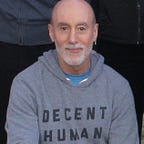Healing America’s Narratives: Enough With the Talking Points.2
[Part of a series, this essay focuses on the intersection of Healing America’s Narratives: the Feminine, the Masculine, & Our Collective National Shadow with Enough With the Talking Points — both books available here]
In the previous post, we introduced five broad categories that are essential to consider if we’re genuinely committed to doing more good than harm in conversation (the subtitle of Enough with the Talking Points).
The first of the five essentials is knowing yourself, your view, and your biases, and working with what and how you see — especially regarding cultural givens, and including invisible influences beyond culture. The work here is to recognize and suspend preconceptions, judgments and assumptions.
Nowadays (and perhaps throughout history) when someone expresses their view of some issue, event, or concept, if we listen carefully, we can generally learn more about the views of the person expressing than we can about the issue, event, or concept. The easiest way to see this for yourself is to listen to a politician or paid news celebrity that you don’t like or trust. Try to differentiate any facts they might share from their views about the issue. You can also read comment threads on social media or in online news sources — the commenters often expose themselves with very little reference to the article or post they think they’re commenting on.
A more useful, and more challenging way to see this for yourself is to listen to a politician or paid news celebrity that you do like. Try to differentiate any facts they might share from their views about the issue. If you’re authentically able to differentiate in this way — not easy because of your liking or trusting this person — you’ll discover that most of the folks you like and trust and the folks you don’t like or trust are doing the same exact thing (providing insight into who they are as they whack the news mole of the day), albeit from different — often opposing — points of view.
The most useful and most challenging way for you to see this for yourself is to listen to yourself talk. Try to differentiate any facts you mention from your views about the issue at hand and your general views of life and the world. What are you making clear about who and how you are through what you choose to say and how you speak about the issue at hand?
Rather than asking what is it about this issue or person that leads me to react as I do, ask what is it about me such that I react to this issue or person as I do. Then do your work.
To the extent each of us does not know the myriad influences that inform what we call our opinions, we will continue to mistake what Thomas Merton called “the anonymous authority of the collectivity speaking through [our] mask” for our own perspective. Forty years after Merton wrote that, Ken Wilber referred to the “vast intersubjective network” that speaks through us.
What (or who) is speaking through you?
